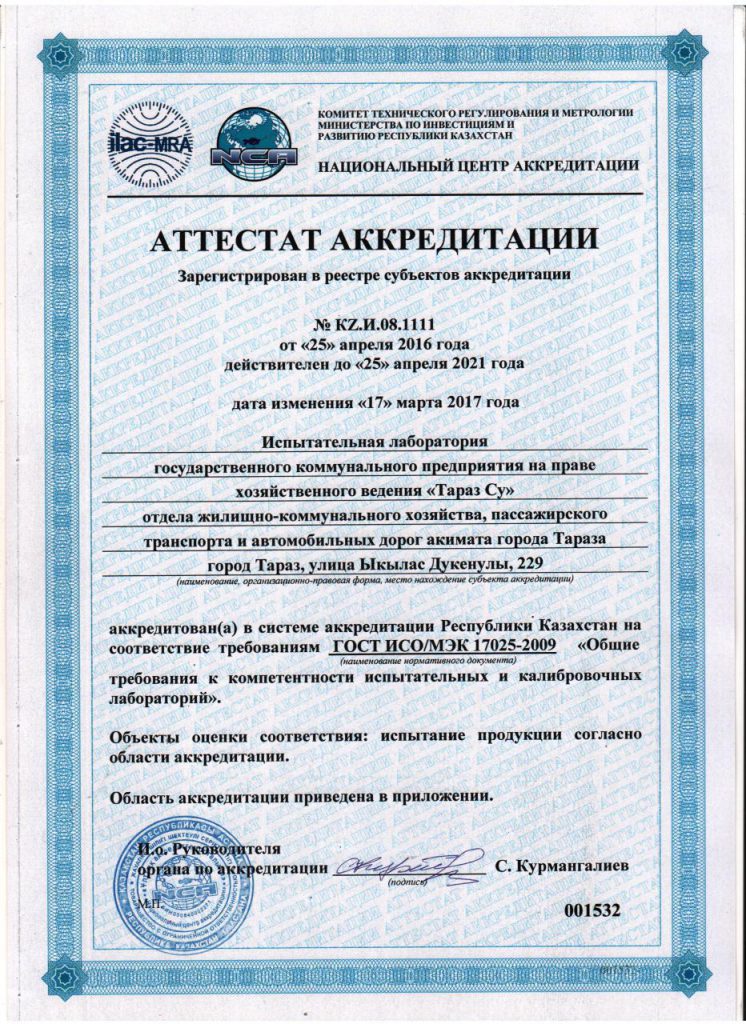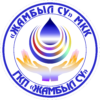Laboratory
Testing Laboratory of SCE “Zhambyl Su”
Drinking water is an essential element of life, our wealth, health, and joy.
The quality of drinking water distributed through the centralized water supply system is a matter, which the Company pays very serious attention. The water quality affects the health of people, sanitary and epidemiological well-being, and amenities of the city.
Main requirements imposed on drinking water are its epidemiological and radiation safety, chemical safety, and good organoleptic properties.
The quality of drinking water, its sources, and the quality of industrial wastewater produced by the Company are monitored by the accredited test laboratory of SCE “Zhambyl su”.
The laboratory undertakes its activities under the existing legislation of Kazakhstan, organizational documents, procedural guidelines, and various testing regulations.
The test laboratory is accredited and meets all the GOST ISO / IEC 17025-2019 requirements as evidenced by the accreditation certificate No KZ.T.08.E0309 as of 14 june 2021.

The test laboratory constantly proves its competence by participating in various events. For example, the laboratory takes part in an annual competition held among test laboratories, where they do tests of standard water samples for ion-salt composition. The laboratory always achieves high scores at the event. Another event, which the laboratory took part in, is the competition “The best laboratory” held in “Training Center “Ekspert” LLP and devoted to the day of quality, where our laboratory won the first place.
The test laboratory consists of three sections, two sections of chemical and bacteriological analysis of drinking water and the section of chemical analysis of wastewater. Activities of sections of chemical and bacteriological analysis of drinking water are interrelated.
Organoleptic, bacteriological, and chemical properties of drinking water are monitored every day under the schedule approved by the Director of SCE “Zhambyl Su” and agreed on by the Head of the Taraz Department of Public Health Protection of Zhambyl Region, the Committee for Public Health Protection of the Ministry of Healthcare of the Republic of Kazakhstan.
According to the Sanitary Rule as of 16.03.2015, No 209 “Sanitary and epidemiological requirements for water sources, water intake points for household and drinking purposes, domestic and drinking water supply and places of cultural and domestic water use, and safety of water facilities”, the laboratory monitors the following 29 parameters of the drinking water:
Organoleptic indicators:
- Smell
- Taste
- Colour
- Turbidity
General indicators:
- pH value
- Total hardness
- Total dissolved solids (dry residue)
- Permanganate value
- Oil products, total
Inorganic substances:
- Boron
- Iron
- Sulfates
- Manganese
- Copper
- Zinc
- Molybdenum
- Chlorides
- Nitrates
- Lead
- Ammonia
- Aluminium
- Nitrites
- Polyphosphates
- Chromium
- Fluorine
Microbiological indicators:
- Thermotolerant coliform bacteria
- Total Coliforms
- Total bacterial count
Substances found in water due to treatment.
- Free residual chlorine, the sanitary and toxicological control.
The drinking water quality control program includes the radiological monitoring of water at checkpoints before delivering the water through the distribution networks. The monitoring is performed once a year.
The City of Taraz has an integrated system of centralized domestic, industrial, and firefighting water supply. The Company produces groundwater only from the Talas-Assinsky deposit.
The centralized water supply system is fed with water from the following sources:
- Main water intake No1 in the village Zhalpak-Tobe (after disinfection) feeds water through the Ø 700 mm water pipe to the II elevation pump station in Peschannaya Str., through the second Ø 1000 mm water pipe water is fed to the CHP Plant No 4. Both water pipes are connected by two shunt pipes to redirect water in case of emergency.
- Water intake № 3 in the south-western part of the city, near the railway station Kumshagal, feeds water through the three Ø 500 mm, Ø 700 mm and Ø 1000 mm water pipes to the II elevation pump station No 3, where the water is disinfected and supplied to the CHP Plant RK-4 and microdisticts of the city.
- Wells are dispersed throughout the city and connected to the water distribution network.
According to the data provided by the Company’s test laboratory, the composition of water supplied to the water networks from wells, including local wells, meets all requirements of the national Sanitary Rules and does not require additional treatment. Before being distributed through the water networks, water is treated with sodium hypochlorite (electrolysis of boiled salt) to keep the water disinfected on its way to the end customer. This is done by chlorinators “Chlor 2001”, and every hour the water is tested to measure chlorine residual in it. A slight smell of chlorine in drinking water proves that the water is disinfected from bacteriological contamination and meets the standard. Light chlorine admixture – the chlorine residual is required to prevent the water from contamination when it is delivered through pipelines to the end customer. The chlorine residual is absolutely harmless to a human health, and when the chlorinated water is kept in an open dish or boiled the smell of chlorine disappears. The last but not least in importance is the section of the laboratory for treated wastewater monitoring. The main function of the section is the wastewater quality control.
The laboratory is furnished with measurement instruments, test and auxiliary equipment, chemicals, breeding grounds, and labware used to determine various parameters.
Every year the Company allocates funds for regular update and modernization of the laboratory equipment.
New water quality assessment and monitoring methods are employed in the laboratory on a regular basis.
Measuring instruments and testing equipment available in the laboratory today provide the completeness and correctness of tests and the reliability and accuracy of the test results pursuant to requirements.
The laboratory personnel is qualified enough to do the required tests.
The test laboratory of SCE “Zhambyl su” is a modern and exemplary laboratory with a high level of qualification.
